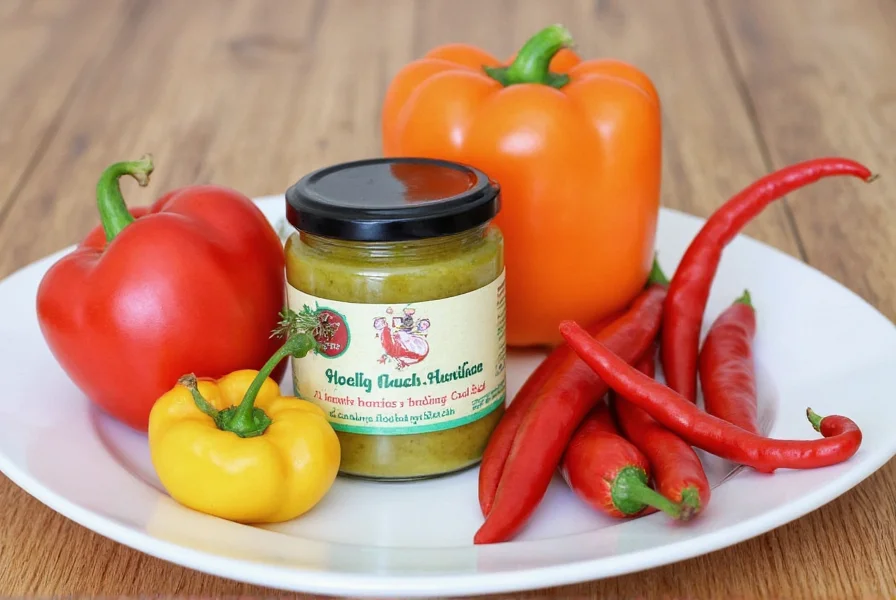Table of Contents
Step-by-Step Chili Recipe
Here's how to make perfect chili in under 90 minutes:
- Prepare ingredients: Dice 1 onion, mince 3 garlic cloves, and chop 1 bell pepper. Measure 2 tbsp cumin, 1 tbsp paprika, and 1 tsp oregano.
- Brown protein: In a large pot, cook 1.5 lbs ground beef (or plant-based alternative) over medium heat until fully browned. Drain excess fat.
- Sauté aromatics: Add onion, garlic, and bell pepper to the pot. Cook for 5 minutes until softened.
- Add spices: Stir in cumin, paprika, oregano, 1 tsp salt, and ½ tsp black pepper. Toast for 1 minute to release flavors.
- Incorporate base ingredients: Add 1 can (28 oz) crushed tomatoes, 1 can (15 oz) kidney beans (drained), 1 can (15 oz) black beans (drained), and 1 cup beef broth. Mix well.
- Simmer: Bring to a boil, then reduce heat to low. Cover and simmer for 45-60 minutes, stirring occasionally.
- Adjust seasoning: Taste and add more salt, cumin, or hot sauce as needed. For thicker chili, simmer uncovered for 10 additional minutes.

Essential Chili Ingredients Explained
Understanding why each ingredient matters transforms your chili from basic to exceptional:
- Chili Peppers: Jalapeños (mild, 2,500-8,000 SHU) provide fresh heat; dried ancho chiles (1,000-2,000 SHU) add smoky depth. Always remove seeds for controlled heat.
- Tomatoes: Crushed tomatoes create rich texture. For brighter flavor, add 1 tbsp tomato paste during sautéing.
- Beans: Kidney beans offer firm texture; black beans add earthy notes. Always drain and rinse canned beans to reduce sodium.
- Spices: Toasting whole cumin seeds before grinding enhances nutty flavor. Smoked paprika creates depth without extra heat.
Mastering Spice Levels
| Heat Level | Scoville Range | Best Pepper Choices | When to Use |
|---|---|---|---|
| Mild | 0-2,500 SHU | Jalapeño (seeds removed), Poblano | Family meals, children's dishes |
| Medium | 2,500-30,000 SHU | Serrano, Chipotle | Weeknight dinners, casual gatherings |
| Hot | 30,000-100,000 SHU | Habanero, Thai Bird's Eye | Spice enthusiasts, competitive cook-offs |
| Extreme | 100,000+ SHU | Carolina Reaper, Ghost Pepper | Special challenges, experienced cooks only |
Pro Cooking Techniques
- Layering flavors: Sauté onions/garlic before adding meat to build flavor base. Add spices after meat to prevent burning.
- Acid balance: Finish with 1 tbsp lime juice or vinegar to brighten flavors and cut through richness.
- Texture control: For chunky chili, add beans whole. For smoother texture, mash ¼ of beans before adding.
- Slow-cook method: For maximum depth, transfer to a slow cooker after initial steps and cook on low for 6-8 hours.
Frequently Asked Questions
What's the secret to thickening chili without cornstarch?
Simmer uncovered for 15-20 minutes to reduce liquid. Alternatively, mash 1-2 tablespoons of beans against the pot side to release starch naturally.
How do I prevent chili from becoming too spicy?
Remove pepper seeds and membranes before cooking. Add dairy (sour cream/yogurt) or sweet elements (1 tsp honey) to balance heat. Always taste before adding more peppers.
Can I make vegetarian chili taste meaty?
Yes! Use mushrooms for umami, 2 tbsp soy sauce for savory depth, and 1 tbsp nutritional yeast for richness. Smoked paprika adds meat-like complexity.
Why does my chili taste bland after cooking?
Most likely missing acid or salt. Add 1 tsp vinegar or lemon juice and ¼ tsp salt at the end. Toasting spices before adding also prevents flavor flatness.
What's the best way to store leftover chili?
Cool completely and refrigerate in airtight containers for up to 5 days. For freezing, portion into freezer bags and lay flat. Reheat with 2 tbsp water to restore texture.










 浙公网安备
33010002000092号
浙公网安备
33010002000092号 浙B2-20120091-4
浙B2-20120091-4